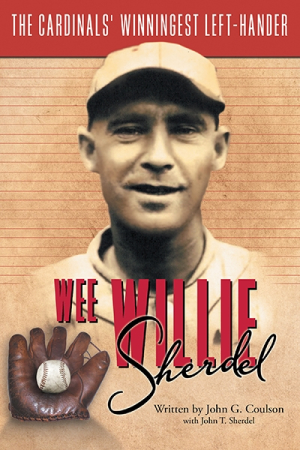Wee Willie Sherdel
The Cardinals' Winningest Left-Hander
A meticulously researched labor of love, the book is packed with generous helpings of era-specific details.
He’s the winningest left-handed pitcher in St. Louis Cardinals history, and he outdueled the Yankees’ immortal Babe Ruth and Lou Gehrig in the World Series. He succeeded with grit and a deceptive slow pitch that was ranked as one of the top ten changeups ever by no less a baseball authority than Bill James. Yet the story of William Sherdel remains mostly unknown, even to aficionados of America’s favorite pastime. John G. Coulson, along with Sherdel’s grandson John T. Sherdel, attempt to rectify matters with Wee Willie Sherdel, an affectionate recap of Sherdel’s life and baseball career that doesn’t lack in breadth, even if it’s short on depth.
The book is organized chronologically, starting with Sherdel’s modest origins in small-town Pennsylvania and following him through his rapid ascent to the majors. As the southpaw’s career takes him from the start of World War I and into the depths of the Great Depression, each chapter is devoted to a single season. His fortunes rise and fall along with his team’s. Along the way, the slight Sherdel (thus the nickname “Wee”) mixes it up with a host of Hall of Famers, including St. Louis manager Branch Rickey, star batter Rogers Hornsby, and pitcher Grover Cleveland Alexander.
Coulson and John Sherdel don’t skimp on the details: every chapter is packed with generous helpings of photos, quotes, and clippings from newspapers of Sherdel’s era. The book contains plenty of minutiae for baseball fanatics to pore over. Its best passages vividly recall the freewheeling days of early twentieth-century baseball, when the Cardinals were a scrappy underdog struggling to match the fat-cat teams of Chicago and New York, and when a player might get punched out by local cops because he played for the wrong team.
Though the book is a meticulously researched labor of love, it falls short when it comes to chronicling its central subject. By all accounts, Willie Sherdel was a soft-spoken, hardworking family man and an avid fisherman, but either due to reticence or lack of information, not much else is offered about his personal life. Sherdel becomes a bit player in his own story; more focus is devoted to the revolving cast of players and teams around him. Wee Willie Sherdel offers little beyond box scores when it comes to explaining the longevity and success of Sherdel’s career.
When the Cardinals finally face the big, bad Yankees in the World Series, Sherdel pitches two sterling games, only to lose both times in heartbreaking fashion. Such bad luck marks the difference between household names and worthy players forgotten by history; more pathos and insights like these would have helped lift Wee Willie Sherdel above impressively researched statistics and player quotes.
Reviewed by
Ho Lin
Disclosure: This article is not an endorsement, but a review. The publisher of this book provided free copies of the book and paid a small fee to have their book reviewed by a professional reviewer. Foreword Reviews and Clarion Reviews make no guarantee that the publisher will receive a positive review. Foreword Magazine, Inc. is disclosing this in accordance with the Federal Trade Commission’s 16 CFR, Part 255.

